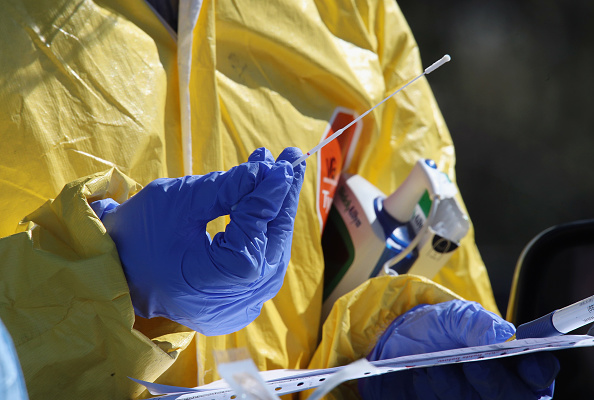
A close-up view of a swab used by medical workers tend to administer the coronavirus test at the drive-in center at ProHealth Care on March 21, 2020 in Jericho, New York. Photo Credit: Bruce Bennett, Getty Images
New rules by the Centers for Medicare and Medicaid Services would penalize hospitals and laboratories that fail to report Covid-19 data.
The new rules would require hospitals to report the number of confirmed or suspected Covid-19 patients to the Department of Health and Human Services, as well as the number of occupied ICU beds, and the availability of ventilators, protective equipment and other essential supplies.
Hospitals that fail to comply with the new reporting requirements could face having CMS withhold their Medicare payments.
“These new rules represent a dramatic acceleration of our efforts to track and control the spread of COVID-19,” CMS Administrator Seema Verma said in a news release. “Reporting of test results and other data are vitally important tools for controlling the spread of the virus and give providers on the front lines what they need to fight it.”
The rules also implement reporting requirements for other entities, including all laboratories conducting Covid-19 testing. Labs that fail to report daily Covid-19 results to HHS will face a penalty of $1,000, plus $500 for each subsequent day.
Hospitals pushed back against the new requirements, with American Hospital Association CEO Rick Pollack calling the approach a “regulatory sledgehammer.”
“Hospitals and health systems consistently have put forward a good faith effort to report the data needed to battle COVID-19 under very trying circumstances, despite the ever-changing requests from the government on data reporting. Since February, the government has made at least six changes to how they want hospitals to report data,” he said in a statement.
Inadequate testing levels and patchy data have slowed the U.S. pandemic response. Even for data collected by the Centers for Disease Control and Prevention, “The validity and reliability of the data are not fully known. Inspection of the data suggests a patchwork of inconsistent reporting from state and commercial labs,” Dr. Eric Schneider, senior vice president of policy and research for the Commonwealth Fund, wrote in the New England Journal of Medicine in July. “Yet these data are the best we have.”
In the last month, the Trump Administration suddenly instructed hospitals to report data to HHS instead of the CDC. The shift to the new data system, managed by private contractor TeleTracking Technologies, has been bumpy, to say the least. For some states, the federal data didn’t match up with state-reported numbers. And two weeks ago, HHS CIO Jose Arrieta unexpectedly resigned.
John D’Amore, president and co-founder of clinical data optimization company Diameter Health, said the ruling would increase pressure for Covid-19 testing and reporting, but also might introduce new challenges.
“Since the rules require data be shared federally, in addition to local and regional public health reporting requirements, getting consistent test counts and net new cases may become more complicated. Many point-of-care systems cited in the regulation lack robust interoperability capabilities, so data may be dirtier and less complete than conventional labs,” he wrote in an email. “As public health reporting has skyrocketed over the past six months, Diameter Health has seen increased demand for data cleanup and integration from new data sources. Making sense of the data for positivity rates, cases and local outbreaks will be critical for public policy as we exit the summer.”














